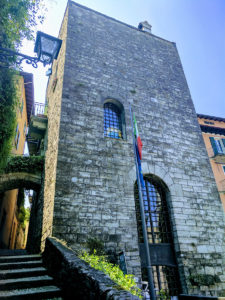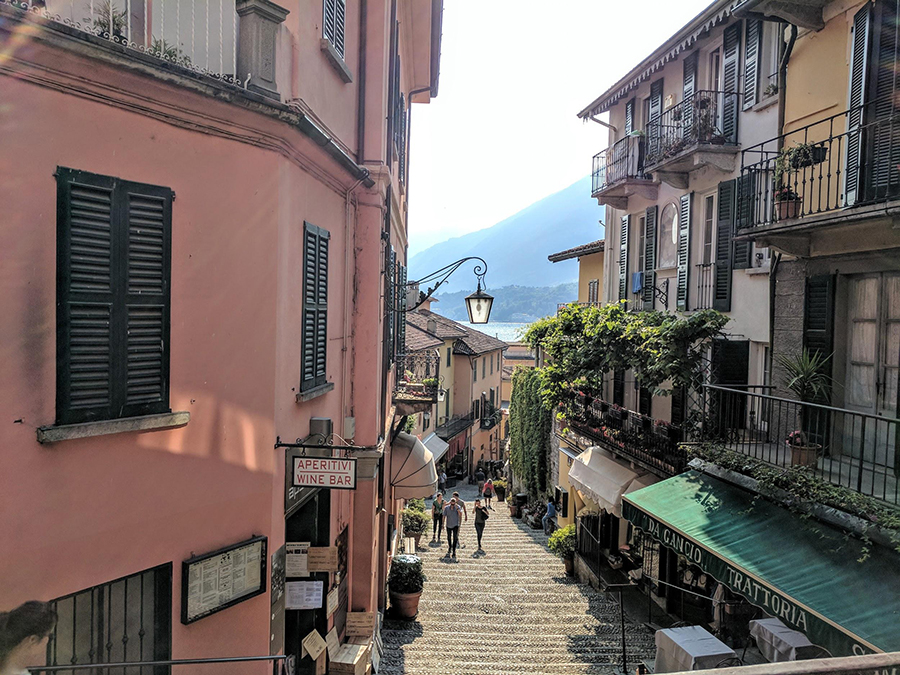The Humanevangelist: To End War, We Must First Understand It

I’m sitting in one of the most beautiful spots in the world, under a tower of war. Back in the United States it’s Memorial Day. With that on my mind, this tower forms a nearly perfect symbol both of our wretched past and the chance for lasting peace that is slipping through our clenched fists as I write.
Since 2010, the number of wars has been on the rise, and the major powers are involved in most. Russia under Putin aims to revive the “Great Game.” China is a crouching tiger looking to leap on Asia’s back. As for the US, our foreign policy rests in the hands of a president with all the calm foresight and strategic acumen of Yosemite Sam.
But before you run the bedsheets through a ceiling hook, consider the story of this squat, charmless tower, the thousand-year-old remnant of a fortress built to defend the beautiful lakeside town behind it.
Bellagio is a jewel set in the necklace of the Alps. It rests atop a sloping peninsula that juts into Lake Como. On a visit in 1845, the French writer Gustav Flaubert was moved to write in his diary that the vista “seems designed as a balm to the eyes.” Yet, Bellagio’s beauty has exacted a terrible price. If all the blood spilled here returned, Lake Como would run red.
 Inhabited since at least since the tenth century BCE, Bellagio has been unceasingly embattled. Celtic villagers, dwelling here from the mists of time, were overthrown by the Gauls, who made their garrison on this spit of land but were in turn overthrown by the Romans. The Romans fell to the Germanic Lombards, who eventually lost out to the Franks under Charlemagne, who gave way to a series of fractious Italian dukes. On and on it went.
Inhabited since at least since the tenth century BCE, Bellagio has been unceasingly embattled. Celtic villagers, dwelling here from the mists of time, were overthrown by the Gauls, who made their garrison on this spit of land but were in turn overthrown by the Romans. The Romans fell to the Germanic Lombards, who eventually lost out to the Franks under Charlemagne, who gave way to a series of fractious Italian dukes. On and on it went.
World War II left more dark stains on Bellagio’s history. The Fascist writer Filippo Tommaso Marinetti made this his base for propaganda on behalf of Mussolini. But the resistance also had a foothold here. Soldier, lawyer, and publisher Teresio Olivelli broke with the Fascists to lead a Christian resistance movement. It didn’t end well for him. In 1944 Olivelli was imprisoned and tortured before being sent to a concentration camp, where he was beaten to death.
At last, however, the spasms of violence subsided. Millennia of warfare gave way to peace, here and in much of the world. The dark tower has been remade into Torre delle Arti, the tower of arts, and a welcome center for tourists.
Why? What’s changed?
To answer that question, we have to try to understand why war prevailed for so long. To some the casus belli lies in patriarchy. To others, the answer bubbles up from the cauldron of capitalism and its forebear, the war profiteer. These are not entirely wrong, but they miss the explanatory mark.
Let’s ask a deeper question: Are humans naturally violent, or is it corrupt civilization that bends our arms to war? The debate has gone on for ages, but at long last we have an empirical answer. The closer we get to nature, the more violent we become.
This fact—and it is a well-supported fact—repels many people. There’s an irony here: the more civilized we grow, the more Romantic our view of nature. It’s no shame; nature can be beautiful (and civilization ugly), but to come to grips with underlying reality, we have to shrug off our Rousseauian inclinations.
Jean-Jacques Rousseau’s idealistic claims proved false. (“Man is born free and everywhere he is in chains … I venture to believe that I am not made like any of those who are in existence.”) Sorry, frere Jean-Jacques, human nature is real, fixed, and written not in our stars but in our genes.
By the pitiless logic of natural selection, violence has all too often been worth the risk. Only human culture can cantilever our way out of it. Many still cling to the dream of peaceful hunter-gatherer tribes, but this neither makes sense nor accords with the best available evidence. To the contrary, the more sophisticated and representative our institutions of governance, the more peaceful our lives have become.
Steven Pinker made the case in The Better Angels of Our Nature: Why Violence Has Declined. Though widely acclaimed, skeptics have disputed his claims that the past was far more violent than the present. Let’s therefore draw on the independent checks of Max Roser for a broad estimate that pre-state peoples suffered violent deaths at rates of ten to twenty times those of modern residents of stable states. The horrific casualty rates we see in Syria now were everyday life in the past.
Evolutionary biologist Richard Wrangham has had the extraordinary experience of witnessing both a recent human genocide (the calamity in Rwanda) and the first documented instance of a murderous ambush perpetrated by a band of chimpanzees.
“This sort of thing wasn’t supposed to happen among non-humans,” Wrangham and his collaborator Dale Peterson wrote. “Until the attack on [the chimpanzee] Godi, scientists had treated the remarkable violence of humanity as something uniquely ours.”
But chimps are far from alone in deploying coalitional violence against their own kind. With apologies to Cole Porter, let us note that dolphins do it, wolves do it, even sea anemones do it.
The evolutionary logic is plain: If one group decided that rather than barter they could ambush a neighboring group, kill or drive off the males, and seize females and the group’s material resources, who was to stop them? Boko Haram didn’t invent this strategy; it was all around them in nature and almost certainly in their genes. Ideology just gave them permission to break civilization’s rules.
 The evidence that war is natural goes beyond intramural violence in other species. There’s also the universal proclivity for violence in our own adolescent males. Unless they are redirected into sports, demolition derby, or something similar, young men everywhere tend toward gang violence. Just ask Romeo and Mercutio. Or the Disciples on Chicago’s Southside.
The evidence that war is natural goes beyond intramural violence in other species. There’s also the universal proclivity for violence in our own adolescent males. Unless they are redirected into sports, demolition derby, or something similar, young men everywhere tend toward gang violence. Just ask Romeo and Mercutio. Or the Disciples on Chicago’s Southside.
If not all men are brutes, it’s only because our hypersocial species has long had counterstrategies (mutual defense, mockery, exile of bullies) and alternative mating strategies (courting through music, art, or poetry). But brutes there are, and worse.
That’s why we must be clear in our thinking, unromantic in our beliefs, and determined in our actions. To preserve peace, we must reject appeals to our emotions designed to stir fear, hatred, aggression, and, finally, war. Embracing our common humanity is in our common interest.
Keep our innate barbarism at bay. Fill the tower of war with good will and art.
All photos by Clay Farris Naff.
